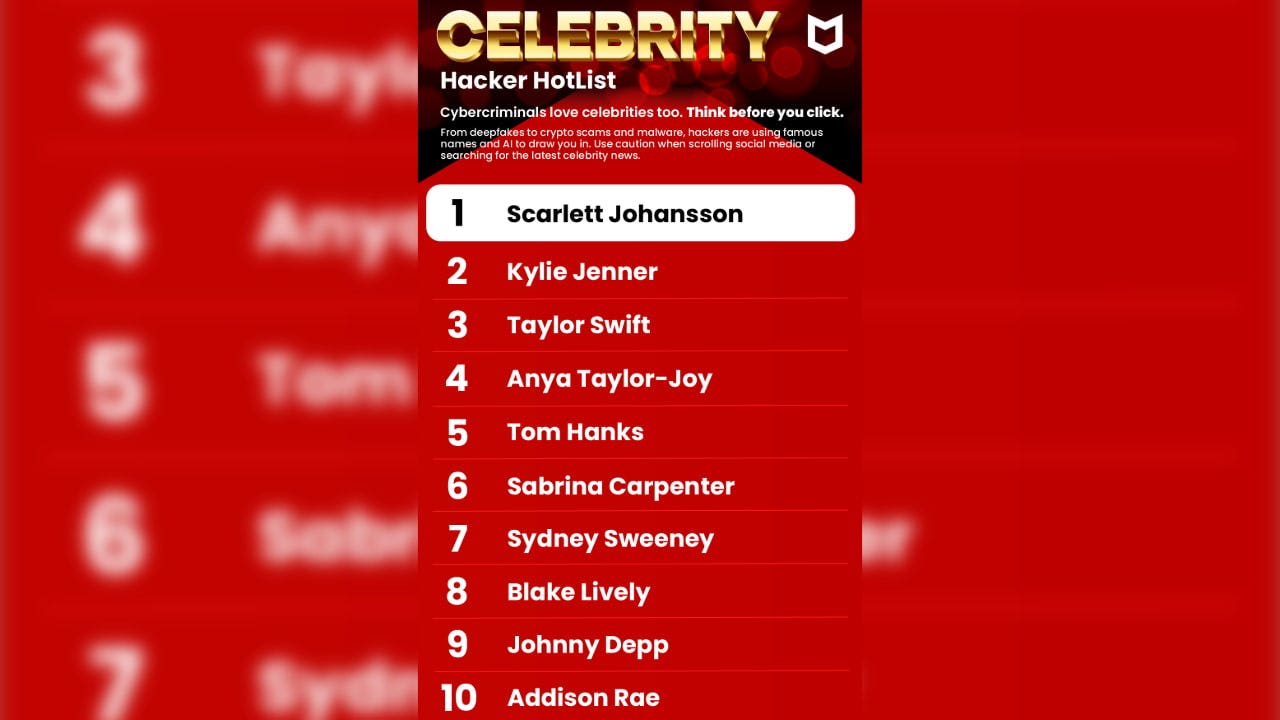10 celebs most targeted by malicious deepfake scams, dangerous search results

Impersonation scams are on the rise in 2024, with scammers targeting celebrities more than ever before. From deepfake videos to fake endorsements, cybercriminals are using the likeness of famous faces to trick unsuspecting victims. According to cybersecurity firm McAfee, here are the top 10 celebrities who have been frequent targets of malicious deepfake scams this year.
1) Scarlett Johansson: The \”Avengers\” star has been used in various advertisements and endorsements without her permission, including an AI model that featured a voice similar to hers.
2) Kylie Jenner: The reality star’s name and likeness have been used in social media giveaway scams and fake beauty products.
3) Taylor Swift: Scammers have used Swift’s name and likeness for fake endorsements, ticket scams, and disinformation campaigns.
4) Anya Taylor-Joy: The \”Queen’s Gambit\” star has been targeted in scams involving fake social media accounts and misinformation.
5) Tom Hanks: Scammers have used Hanks’ likeness to promote fake health products without his consent.
6) Sabrina Carpenter: The singer has been a target of scams promoting fake ticketing schemes and controversial apps.
7) Sydney Sweeney: Scammers have used Sweeney’s name and likeness to promote fraudulent cryptocurrency schemes.
8) Blake Lively: The actress has been targeted in scams promoting fraudulent weight-loss products.
9) Johnny Depp: Depp’s likeness has been used in giveaway scams, cryptocurrency schemes, and misleading fundraising efforts.
10) Addison Rae: The social media influencer has been targeted in scams involving fake endorsements, giveaways, and cryptocurrency promotions.
With the rise of generative AI, deepfake cybercrime is becoming more prevalent. These scams can be difficult to detect, as they can create highly realistic video and audio clips that mimic a person’s likeness. To avoid falling victim to deepfake scams, here are five tips:
1) Verify sources: Always check the credibility of the source before trusting any content, especially if it involves a celebrity or public figure.
2) Look for inconsistencies: Pay attention to details in videos or images, as deepfakes can have subtle inconsistencies that give them away.
3) Invest in strong antivirus software: Protect your devices with reliable antivirus software to guard against deepfake scams and other cyber threats.
4) Educate yourself: Stay informed about the latest deepfake technology and common scams associated with it.
5) Use reverse image search: If you come across suspicious images or videos, use reverse image search tools to see if the content has been altered or used in other misleading contexts.
As AI technology continues to advance, it is crucial for companies and governments to implement safeguards to prevent its exploitation by cybercriminals. By staying informed and vigilant, you can protect yourself from falling victim to deepfake scams and other cyber threats.




